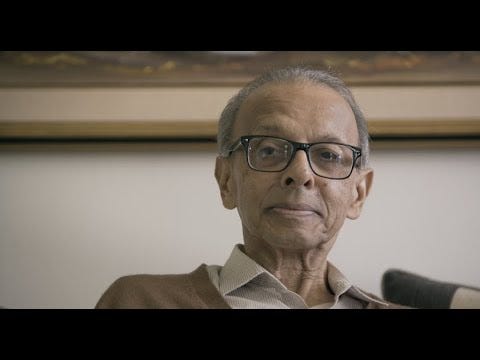Cameras everywhere.
From traffic lights to apartment complexes to warehouses.
Recording movement 24/7. The eyes in the sky as well as on the ground.
Kids being monitored remotely, and exams conducted with cameras vigilantly recording every move and click of the mouse. Or surgeries monitored for insurance purposes.
It wasn't meant to be this way.
There are several origin stories about how it began.
Apparently, a group of scientists at Stanford grew tired of walking to the coffee machine and finding it empty.
One of them hooked up a camera and the other wrote a script to transmit the image to other members of the team periodically to check the level of coffee available.
From these humble origins, we've expanded what cameras can see, record and transmit anywhere in the world.
There are an estimated billion cameras now in use and that could be conservative. In addition, the cabling, the recording equipment and the motion detection cameras have slowly made their way up the value chain.
These markets barely existed about 2 decades ago.
The most surveilled cities in the world present an interesting picture.
Has it led to cities becoming safer? Or do people think they will eternally be watched and put it at the back of their minds and get on with life?
Right now, we don't know.
But the world's longest running webcam experiment goes back to 1927. One drop of bitumen drops every 8-9 years.
Talk about slow TV!
The foot soldiers of ecommerce
They hang around restaurants waiting to pick up food orders.
The red and orange t-shirts of the companies stand out.
Weaving through traffic, going the wrong way through roads, they land up at homes in double quick time.
The home delivery army has grown exponentially. For two of the largest players in India, Zomato and Swiggy, there are nearly 500,000 delivery personnel in the field.
A decade ago, the market didn't exist.
New processes have been put in place for recruitment, training and handling difficult customers.
At Amazon, work pace is set by algorithms. By calculating the distance workers can travel every minute, the number of things that have to be picked by machines and the tasks to be done by workers - it has been optimised down to the second.
The same thing has happened to ride sharing. The business model has to go against the tide. When there is heavy demand, there is heavy traffic as well. And that's exactly the time people turn to the apps.
To make things easy for customers, ecommerce, ride share and home delivery companies have to handle the complexity that stems from rising demand.
One of the hardest things to handle is the reducing time frame between orders and delivery.
As people get used to faster delivery in one category, they get impatient with delays in others.
That's impacting traffic on roads and driving up warehouse rents around cities. The hubs are here to ease distribution pressures.
And we'll have to watch how far the ripples spread as more orders roll in.
The evolution of the cloud messenger
Back in the 5th Century CE, when one of the greatest Indian authors Kalidasa composed the brilliant Meghaduta, or 'Cloud messenger', he meant the fluffy, white, shape-changing formations spreading lazily across the sky.
Pining for his beloved who lives far, far away, he asks a cloud to deliver a message of longing.
Today, he can compose a lyrical email. Or create a meme. Or even an emoji. Press 'send'. And messengers residing in 'clouds' will instantly swing into action.
Then, Kalidasa could not have estimated how long the message would take to travel the distance. Days or weeks. Or even if anything was lost in translation.
Today, he will instantly get a 'delivery report', a 'read report' and probably expect a response within the hour.
And if a reply isn't forthcoming, he will seriously worry about the state of the relationship.
The analogies of the past mean completely different things in a new age.
There's nothing poetic about what clouds mean today.
A search engine will fetch the latest offerings from Google, Microsoft and Amazon.
Poets waxing lyrical about the same subject would be consigned to page 100, or even lower down the pecking order.
The canopies in the sky, the unfurling of the seasons, or even the wonderful skyscapes are no longer relevant.
Yes, life has got much faster, streamlined and efficient.
The clouds in the sky aren't zipping by in a perpetual hurry. But the ones that dominate our existence are in a state of frenzy.
The poem Kalidasa wrote centuries ago is still revered. Unlike the billions of messages today that are forgotten just as soon as they are read.
Every week, I'll plant a few ideas in your mind on branding, behavior and markets. Triggers for your thoughts. Spread the word to your friends. All you have to do is click the link and enter an email address.












Share this post